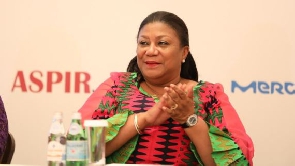First Lady Mrs Rebecca Akufo-Addo has initiated an advocacy project that aims at the prevention and improving access to the early detection and treatment of cervical and breast cancers.
With funding from Roche, an international pharmaceutical company, the effort seeks to increase awareness and care of breast and cervical cancers in the country, with the goal of reducing mortality and improving quality of life of women.
Through her Rebecca Foundation, Mrs Akufo-Addo engaged health experts to deliberate on measures and modalities that would help in the advocacy and education aimed at reducing breast and cervical cancers in 10 regional hospitals.
The stakeholders who attended the workshop included representatives of civil society organizations, Ghana Atomic Energy Commission, Ghana Health Service, Ministry of Health, as well as some oncologists and epidemiologists.
Mrs Sheila Sekyi-Oppong, Strategist at the Rebecca Foundation, who briefed the Ghana News Agency on the sidelines of the workshop, said the stakeholders were engaged to help analyse the provision of breast and cervical cancer services and help identify service gaps.
They would look at infrastructure provisions and develop high impact short to medium plans to resolve existing gaps that militate against cancer care.
Mrs Sekyi-Oppong said the project would be implemented within the National Strategy for Cancer Control in Ghana (2012 - 2016), and the stakeholders are expected to examine global trends and good practices that could be adapted meaningfully to Ghana.
“Moreover, the workshop also seeks to find out what viable cost-effective and efficient steps, beyond the initial advocacy plan could be. The possibilities to be discussed may focus on the contents of the National Strategy for Cancer Control or experiences picked up by our experts on the field that would further strengthen advocacy”.
She said among critical issues identified are advocacy to demystify cancers and early detections that could save lives and improve treatments.
Training and capacity building of frontline health workers, especially at the district health centres and CHPs compound, as well as midwives and community and public health nurses, would also be undertaken so that they would be able to screen women who attend antenatal and post-natal services.
She said doctors would also be encouraged to screen women that attend the hospital for any other complaints “so we can catch such cancers early and stem the rising tide of these diseases”.
Mrs Sekyi-Oppong said a working group has been established out of the workshop and they are expected to come out with a working plan within a couple of weeks and then “as much as possible these things would be implemented in a few districts as a pilot to show the gains and later be translated into the broader national agenda.
Earlier during the discussion, some of the stakeholders decried the fact that only a few women availed themselves to regular screening for cancer diseases and the fact that there is currently no national register on cancers in the country.
They recommended the need to introduce vaccinations for cervical cancer among young girls to ensure prevention as well as promote healthy lifestyles.
Health News of Wednesday, 15 January 2020
Source: ghananewsagency.org













